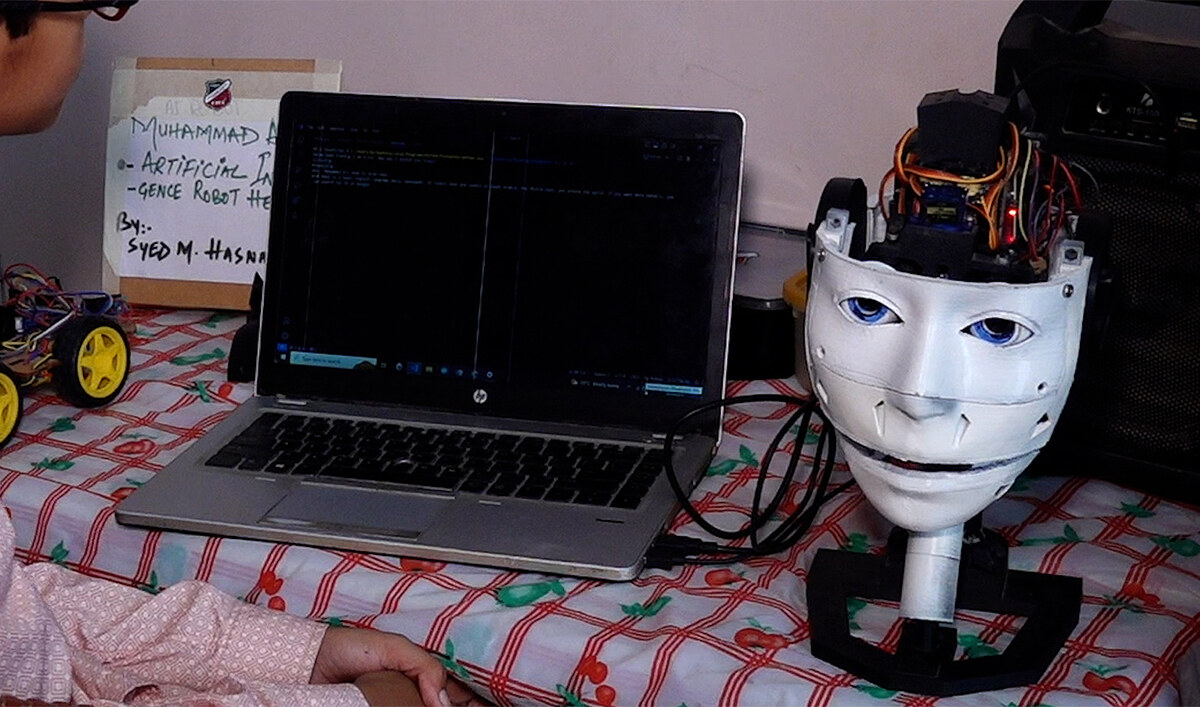KARACHI: Muhammad Hasnain typed for a brief moment on his laptop, then asked a question out loud:
“Muhammad Ali, what is Arab News?”
A blue-eyed robot, so far a white head with a mesh of wires for hair, spoke back in a computer-generated voice:
“Arab News is a Saudi English language daily newspaper. It covers news and events in Saudi Arabia, the Middle East and around the world.”
Ask Muhammad Ali how to make biryani or fix a piping hot cup of tea and he’ll have an answer. He can also operate home appliances, play movies or do online searches following a voice command.

The picture taken on August 24, 2024, shows an AI assistant robot created a Pakistani sixth-grader Muhammad Hasnain in Karachi, Pakistan. (AN photo)
He was created by Hasnain, an 11-year-old who recently passed the sixth grade and built the AI assistant as part of a summer project for a free training course in robotics he attended in his hometown of Karachi.
“This is an AI assistant robot and its name is Muhammad Ali,” Hasnain told Arab News at his home this month. “This AI has a personality [and] a face so you feel like you are talking to a person.”
“It has some extra features such as home automation through which it can control home appliances or open [search] anything on your command. Apart from that, it is also an assistant for me, so if I am making some other projects, it can be helpful there too.”
The tweener’s obsession with science and technology began when he was very young but it was in 2022 that he made a Bluetooth-powered car as a summer project, followed by a virtual reality game in 2023.
Now, Hasnain has built Muhammad Ali, who he says is different from other AI chatbots because he has a “personality and a face.”
There is “something missing” in leading AI chatbots such as GPT, Gemini and Claude, the boy said.
“What today’s AI lacks is personality, it looks like there is a robot stuck in your smartphone who can talk to you via texts. Some have a voice feature too. This one has a personality [and] a face.”
Hasnain says the robot is a Muslim and a Pakistani, and its main goal was to be “kind and helpful.”
“When it was under development and just the eyes were created, he knew about that too,” Hasnain said. “He knows what’s going on around him.”
Hasnain’s father Syed Faraz Haider said his child had always been inclined toward interests that were “unusual” for his age.
“He was extraordinary in terms of his learning capabilities since he was very young,” Haider told Arab News.
“His memory was very sharp. Once you tell him something, [he will not forget it],” he added, describing how Hasnain was able to read entire chapters and write them down from memory.
Hasnain’s teacher Shakeel Abbas, who runs the institute where he enrolled in the robotics class, said he had helped him procure the equipment for the robot but the rest was all him.
“The entire idea and coding has been done by Hasnain,” Abbas said. “We initially provided the guidelines and training for the courses. He is self-sufficient now.”
In the future, Hasnain wants to pursue a career in robotics and game development, he said. He also hopes to give his robot, for now just a head full of wires, a full body. He is also planning a virtual reality project for next year.
“I would want to add a camera to it [Ali] so he knows who he is talking to,” Hasnain said. “Or create his entire body, that will be a great task to take up.”















